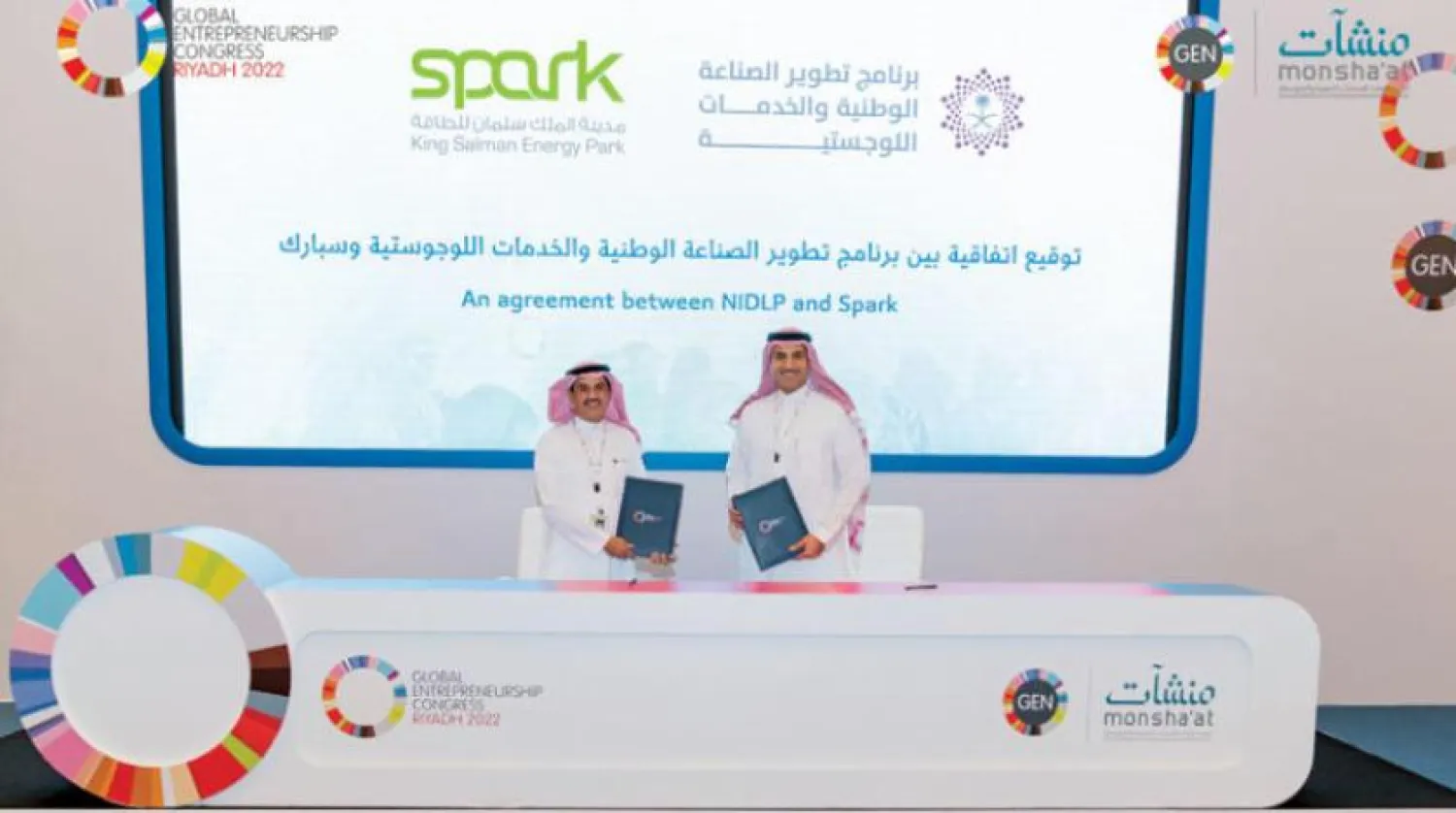The Saudi National Industrial Development and Logistics Program (NIDLP) launched the "Thousand Miles" initiative for small and medium enterprises (SMEs) in the industrial and logistics fields.
The initiative seeks to facilitate material support, feasibility studies, and asset investment.
The launch came during the Global Entrepreneurship Congress (GEC), organized by the Small and Medium Enterprises General Authority (Monsha'at) in cooperation with the Global Entrepreneurship Network.
The conference witnessed the signing and launching of many programs and initiatives with a total value exceeding $1.6 billion.
NIDLP's new program is an opportunity to qualify entrepreneurs in industry and logistics in cooperation with the relevant authorities. It will also enable the qualification of skills in theory and practice, prepare preliminary and detailed feasibility studies, and provide qualitative incentives.
Technical Spending
Governor of the Saudi Digital Government Authority (DGA) Ahmed al-Suwaiyan said that 73 percent of the venture capital funding is going to technology and digital entrepreneurs.
Suwaiyan indicated during one of the panels at GEC that the Kingdom is the highest in the world in technical government spending out of national technical spending, reaching 21.7 percent last year with a value of $24 billion until 2025.
Several panels and sessions were held at GEC addressing young people and their interests, with the participation of several public and private officials aiming to develop entrepreneurs in all fields and provide them with the support needed to increase the most prominent issues of the emerging generation.
Saudi opportunities
CEO of Mohammed bin Salman Foundation (Misk) Badr al-Badr reviewed the trends that dominate entrepreneurship in 2022 and the sectors in high demand in the future.
Badr confirmed that 50 percent of Saudi youth are thinking about starting their own business, indicating that Misk programs are available to all ambitious people who need support.
He added that the most difficult challenges facing entrepreneurs are regulations, local and global expansion, and lack of talent.
"Misk's focus on supporting the entrepreneurship sector is driven by creating real opportunities for the youth to become entrepreneurs, lead successful businesses, and enable employment opportunities for others," he said.
Business setup
Meanwhile, a session entitled "Nurturing Youth Entrepreneurship" hosted Vice President of Nesma Noura al-Turki, Independent Consultant Khaled al-Zamel, and CEO of the Entrepreneurial Learning Initiative Gary Schoeniger to discuss the need of current and future generations for a stimulating environment to develop new skills and ways of thinking.
The panel discussed how governments tap into this potential and empower young people to become future innovators, addressing the key sectors.
Turki stated that maintaining the entrepreneurial mindset within companies and within the youth who choose corporate careers, noting that it is vital to keep the spirit alive 40 years down the line in a company.
Zamil stated that entrepreneurship faces many difficulties and obstacles, noting that it is necessary to prepare for such possibilities always.
Entertainment
The speakers in the "Looking Ahead - Rise of The Film Industry" session discussed the challenges and opportunities of this sector. It was hosted by UTURN Chairman Kaswara al-Khatib and General Manager of MBC Studio Zainab Abu al-Samh.
Khatib stated they are enough stories to reflect the Saudi identity and be creative in highlighting its culture, adding that expectations are high and Saudi and Arab consumers have high energy and taste.
"Be authentic, focus on the storytelling itself. We have our own identity. We have a lot of stories to tell! Amazing stories!"
Samh indicated that the industry has all possibilities and opportunities, with creators capable of producing new materials. She explained that currently, there is a need to focus on young talents that will contribute to the continuation and development of the industry.
Speaking at the "Disrupting Entertainment: A future view" panel, Netflix co-founder Marc Randolph stressed that ideas must be revised to know that the product or service reaches the customer quickly and inexpensively, indicating that addressing the problem is better than creating ideas.
Programs and initiatives
On its third day, GEC witnessed the signing and launch of several programs and initiatives supporting the SME sector and entrepreneurship, with a total value exceeding $1.6 billion in support of the industry and providing financing solutions for SMEs.
The Small and Medium Enterprises Financing Guarantee Program (Kafalah) signed several agreements with the Ministries of Industry and Mineral Resources, Municipal and Rural Affairs and Housing, and Sports, as well as several funds, including the Cultural Development Fund, the Tourism Development Fund, the National Industries Development and Logistics Program (NIDLP).
Kafalah also signed an agreement with King Saud University, Jouf University, and Saudi Incubators and Accelerators.
Monsha'at signed several cooperation agreements with the Council of Health Insurance and the Saudi Commission for Health Specialties, the Saudi Food and Drug Authority to support and empower entrepreneurs and small and medium enterprises.
The Banque Saudi Fransi signed a cooperation agreement with Saudi Arabian Airlines (Saudia).
It also launched the fourth batch of influential mentoring for an ambitious program in cooperation with Endeavor Saudi Arabia to support fast-growing enterprises by facilitating access to the best mentors in local and global networks and linking with regional and international offices.
It aims to support more than 26 fast-growing firms represented by 35 Saudi entrepreneurs, with more than 400,000 direct and indirect jobs.
Over 20 fast-growing Saudi companies cooperated with the global Elite Network to launch the sixth batch of Elite's ambition, aiming to qualify four to six companies to be offered in Nomu, the parallel stock market.
Meanwhile, Chaizer Power signed a cooperation agreement with the European MegaTel Group to manufacture and supply electric vehicle chargers in Saudi Arabia and the Middle East.










